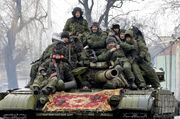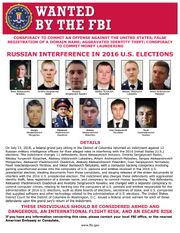The Second Cold War, also known as Cold War II or the New Cold War, was a period of heightened tensions between the United States-led Western Bloc (NATO, the European Union, the Arab states, Israel, and other allies) and the Russia-China-Iran-led Eastern Bloc (the Shanghai Pact, CSTO, and other allies) which began as early as the expansion of NATO into Eastern Europe in 1998 and escalated following the 2014 Crimean Crisis, the 2016 South China Sea territorial dispute, the 2016 presidential election in the United States, and the 2019 Persian Gulf crisis. The 2022 Russian invasion of Ukraine led to a drastic escalation of the conflict and threats of a third world war, especially as the West delivered arms and equipment to Ukraine and Russia threatened to employ nuclear weapons or invade the new NATO member state of Finland.
Background[]
The Dissolution of the Soviet Union in 1991 ended the four-decade-long Cold War between the United States-led democratic Western Bloc and the Soviet-led communist Eastern Bloc, with the fall of communism, steps towards nuclear disarmament, and the spread of Western neoliberalism worldwide leading to the creation of a "New World Order". The Russian SFSR became the independent Russian Federation, inheriting the USSR's United Nations membership. Relations between US presidents George H.W. Bush and Bill Clinton and Russian president Boris Yeltsin were warm during the early 1990s, signing the START II arms control treaty in 1993. However, neither superpower was willing to abandon their alliance systems, with Russia forming the Confederacy of Independent States (CIS) with the former Soviet republics, and the United States overseeing NATO's eastward expansion. Russia opposed NATO's intervention against FR Yugoslavia during the Bosnian War of 1992-1995 and the Kosovo War of 1999, and the US Senate vote to expand NATO to Poland, Hungary, and the Czech Republic in 1998 led to adverse reactions from Russia.
Relations between the United States and NATO and the Russian Federation further deteriorated during the early 2000s as American president George W. Bush pursued a more unilateral foreign policy as part of his "War on Terror", the West backed the 2003 Rose Revolution in the Republic of Georgia and the 2004 Orange Revolution in Ukraine (both of which ousted corrupt, pro-Russian authoritarian regimes), and the USA withdrew from the Anti-Ballistic Missile Treaty in 2002. In 2007, after the USA planned to build an anti-ballistic missile defense installation in Poland and a radar station in the Czech Republic, Russia threatened to target missiles at the two countries. The United States' invitation of Georgia and Ukraine to join NATO in 2007 was a red line for Russia, and Putin confronted Bush in Bucharest, crashing a NATO dinner and insisting that Georgia and Ukraine were in his sphere of influence; this incident marked the start of an irreversible decline in Russo-American relations.
In 2008, just four months after the Bucharest meeting with Bush, Putin launched an invasion of Georgia to show the Georgians that getting too close to NATO had a price, and his forces seized and held nearly 5,000 square miles of Georgian territory. The Russo-Georgian War saw Russia reinforce its puppet regimes of South Ossetia and Abkhazia, and the war caused Bush to confront Putin at the Olympics; from then on, Bush - who had once claimed to have read Putin's soul and trusted him - decided that Putin was going in a different direction, and that there was little that America could do to put Putin back on an agreeable course.
In March 2009, under President Barack Obama and Secretary of State Hillary Clinton, the United States agreed to a "Russian reset" to begin a fresh start with Russian president Vladimir Putin. On 8 April 2010, Obama and Putin signed the New START treaty to reduce both country's nuclear stockpiles. However, relations again soured during the Russian pro-democracy protests of 2011-2013, with Putin accusing Clinton of signalling some "actors" in Russia. By 2012, the reset had failed and relations remained sour, as the West continued to mistrust and fear Russia, Putin's Russia gradually drifted towards authoritarianism, Eastern Europe continued on the path towards closer integration with the West, Russia continued to seek superpower status, and Russia continued to manipulate trade policies and encourage divisions within NATO.
History[]
In 2012-2014, United States-Russia tensions escalated due to Russian threats of preemptive strikes on missile defense sites in Eastern Europe, new economic sanctions against Russia under the Magnitsky Act, Russian rearmament, Edward Snowden's 2013 mass surveillance disclosures and flight to Moscow, Russian ballistic missile tests in 2014, and, most importantly, the Ukrainian crisis in 2014.
Ukrainian crisis[]

Following the collapse of Viktor Yanukovych's pro-Russian regime in Ukraine in February 2014, pro-Russian activists proclaimed the independence of the Republic of Crimea on 16 March 2014, quickly followed by the Russian annexation of Crimea, which was met with widespread international condemnation. Pro-Russian unrest also broke out in the Russian-majority areas of eastern Ukraine (Novorossiya), leading to the secession of the Donetsk People's Republic and the Luhansk People's Republic. Russian troops were instrumental in the occupation of Crimea and in helping the Novorossiyan republics to fight back the Ukrainian Army in the Donbass War, and Russian-supplied missile systems shot down Malaysia Airlines Flight 17 in July 2014, killing 283 passengers and 15 crew. From March 2014 to 2016, six rounds of sanctions were imposed by the United States, crippling the Russian economy. The US Congress also approved the Ukraine Freedom Support Act of 2014, providing $350 million in arms and military equipment to Ukraine. By the end of 2014, US-Russian relations were at their worst since the end of the Cold War.
The 2022 Russian invasion of Ukraine led to a drastic escalation of the Second Cold War, as Western countries enacted strict economic and diplomatic sanctions against Russia and delivered arms and equipment to the Ukrainians. Fears of a third world war rose in relation to Russia's threatened attacks on the Zaporizhzhia Power Plant, Dmitry Medvedev's threat to use tactical nuclear weapons should the 2023 Ukrainian counteroffensive succeed, and the Wagner Group's move into Belarus and into the Polish border region.
Syria and Iran[]
The United States and Russia were also on opposing sides of the Syrian Civil War, with the United States training and equipping the Free Syrian Army and moderate Islamist rebel groups to fight against the Russian and Iranian-backed Ba'athist regime of Bashar al-Assad. On 30 September 2015, the Russian Air Force began an air campaign against the Syrian Opposition, and top US officials ruled out cooperation with Russia against the Islamic State and the al-Nusra Front. By October 2015, the situation in Syria was said to have devolved into a US-Russia proxy war.
In addition, the United States made peace overtures to Iran, agreeing to the Joint Comprehensive Plan of Action (JCPoA) in July 2015 and apparently halting Iran's progress towards developing nuclear weapons. However, US-Iran tensions remained high due to Iranian support for the Syrian Arab Republic and opposition to the state of Israel.
2016 presidential election[]

An FBI wanted poster for Russian agents accused of interfering with the 2016 presidential election.
The United States 2016 presidential election was an epoch-making moment in the new Cold War, as the term-limited Barack Obama's Democratic colleague Hillary Clinton - an enemy of Russia - ran to succeed the outgoing President. She was challenged by the right-wing populist and isolationist businessman Donald Trump, the Republican nominee. The election was clouded by strong allegations of Russian interference, with Russia's Internet Research Agency engaging in a massive disinformation campaign to spread "fake news" meant to sabotage Clinton's campaign, and also working with the Trump campaign to find damaging information on Clinton following the 9 June 2016 Trump Tower meeting between Trump, his son-in-law Jared Kushner, and campaign advisor Paul Manafort and Russian lawyer Natalia Veselnitskaya. In July 2016, Trump publicly called on Russia to hack Clinton's email server to find damaging information (especially pertaining to the 2012 Benghazi attack), and Russia and WikiLeaks went on to hack the Democratic National Committee and sabotage Clinton's campaign. Ultimately, Clinton won the popular vote, but lost the Electoral College vote to Trump, handing Trump the presidency in one of the most controversial presidential elections in US history.
China[]
While United States-China relations had improved during the 1990s and 2000s, tensions over the status of Taiwan and Tibet and the situation in North Korea continued. In 2015, tensions rose due to China's island-building policy in the South China Sea, with US Secretary of Defense Ash Carter issuing a warning to China in March 2015; however, China continued to build its naval strength and assert its territorial claims in the Pacific. Under Trump's presidency, tensions with China worsened, and, in January 2017, the People's Liberation Army warned that the US military buildup in Asia and its plans to install THAAD missiles in South Korea were making the chances of war "more real".
In 2018, Trump began a trade war with China after labelling China a "currency manipulator", setting tariffs and trade barriers against China with the hope of reviving the United States' moribund manufacturing industry. However, China's retaliatory tariffs heavily damaged the United States agricultural industry, and the promised "Great American Comeback" never happened. The USA also enacted new sanctions against China in response to the 2019-20 Hong Kong protests, and relations further deteriorated as a result of the COVID-19 pandemic, with Trump and the Republican Party blaming China for covering up the pandemic during its early stages.
On 15 September 2021, the United States, United Kingdom, and Australia formed the "AUKUS" security pact with the objective of challenging Chinese influence in the Indo-Pacific region, and one of the results of the pact was the United States' agreement to supply nuclear-powered submarines to Australia. From 2022 to 2023, Chinese-US relations deteriorated as the Fourth Taiwan Strait Crisis caused fears that China would invade Taiwan, although China refused to support the Russian invasion of Ukraine and instead sought to play a central role in mediating an end to the conflict.
Persian Gulf crisis[]

The smoldering wreck of Qasem Soleimani's vehicle in Baghdad
During Trump's presidency, the United States reversed course with regard to its peace overtures to Iran, with Trump falsely claiming that Obama had funded Iran's nuclear weapons program, when, in fact, he had slowed it with the JCPOA. On 8 May 2018, Trump formally withdrew from the Iran nuclear deal, worsening relations with Iran. In 2019, the Persian Gulf crisis began as Iran and the United States faced off in the Persian Gulf in response to Iranian attacks on international shipping, bringing the USA and Iran close to war. In January 2020, in retaliation for Iranian proxy attacks on US targets in Iraq, Trump ordered the assassination of Iranian IRGC general Qasem Soleimani and his proxy commander Abu Mahdi al-Muhandis in Baghdad, nearly leading to war; Iran retaliated with Operation Martyr Soleimani, launching missiles at a US military base and causing hundreds of concussions. War was averted only when Iran accidentally shot down a civilian airliner, leading to massive demonstrations in Iran, and the COVID-19 pandemic also devastated both the USA and Iran and led to a worldwide economic and social shutdown as each country attempted to fight the virus. On 17 August 2020, US intelligence sources claimed that Iran had been paying Taliban factions bounties for the deaths of US servicemen in the Afghanistan War; this came not long after the 26 June 2020 revelation that the Russian GRU's Unit 29155 had been paying similar bounties to the Taliban. In 2023, tensions heated up as the US Marine Corps deployed troops to several commercial ships to protect them from a new wave of Iranian attacks on international shipping.
